

 More Than Money
More Than Money

The United States of America. The land of dreams and opportunities. The Statue of Liberty has long stood as a beacon of hope, promising economic prosperity for the poor and hungry masses. That economic prosperity, however, comes with a price. The economy influences every stage of our lives, whether we are young and idealistic, deep in the workforce building a life, or easing into retirement.
With the economic downturn of recent years, the divide between the haves and the have nots has become more distinct. Children born to middle class families suddenly face an uphill climb to financial success and stability. Teenagers in rural areas such as Southeast Ohio can find themselves adrift, without purpose or opportunity. College students, in the hopes of gaining a solid education, face staggering debt that can follow them for the rest of their lives. As these students take ownership of their lives, the economic choices they make are more vital than ever.
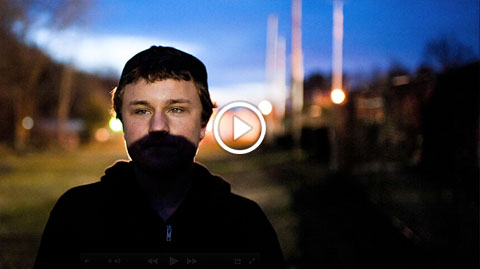
It's really tough watching some of my friends struggle down here, and I want to be able to help them but, you know there's only so many opportunities down here. There's not a whole lot of work to go around and a lot of people say, "oh well there's jobs out there." Well there are but they're at places like Toxico, where you make a living cuttin' up batteries and they give you a paid vacation when the lead levels in your blood get too high. And, if you're not willin' to do that then you're pretty much out of luck because no one else really wants to hire locally down here.
It depends upon so much as to whether or not they have anybody in their life, a parent, or somebody to talk to them, to be with them. Sometimes you can get them interested in something. I never have trouble - if I want something done I can ask somebody and they'll help me. But these kids do take a shopping cart down a hill or a recliner chair which I heard of one time. They put a recliner chair on skateboards and took it down a hill. Uh, they ride as fast as they can and they know they're probably gonna get hurt.
Some of them at least go fishing or hunting. Uh, but, they are, they drink too much, they fight, they're having sex too young and they're having babies too young or getting a disease too young. And nobody seems to be telling them how to prevent that.
And, that brings us back to the question of where you get a job. And its a little easier with a college degree but even then you're still gonna have to leave the area. So you're gonna have to move, to an area where you're not sure you're gonna be able to get a job once you get there and you're already, you know, up to your ass in debt to begin with, so by the time you've spent six months looking for a job on top of that, I mean its really rough.
So, you know, the few people I do know that really made an effort and really did manage to go to college and now they're graduating and they're not in a whole lot better shape then they were to begin with.
And, they may not necessarily have the aim to go to a college. They may, maybe their aim is to go into the military, maybe their aim is to learn to be a heavy equipment operator. Some of these people love to work on cars. They have different goals and maybe different ways of reaching there.
They, some of these young people and maybe even older people like me may get their in a slower pace.
I've really wanted to find a good job around here, but uh, I'm more limited due to my family right now and it's priority for me to take care of my family. I'll find a job when the time comes.
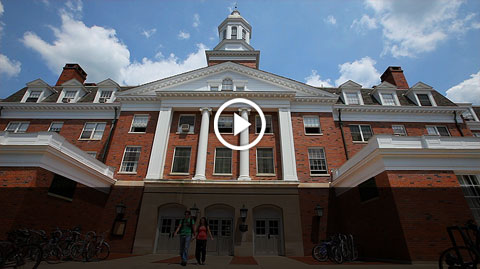
It's hard to go from being poor to getting better because the only way to get better nowadays is to have an education and to have that degree stuck up on your wall so someone can see it. And until you can fork over the money to get that degree and the time and the energy, you are going to remain poor. Just think about it. What kinds of jobs do you get without a Bachelor's Degree?
How much I owe in student loans is something I just don't think about until I absolutely positively have to. If I don't think about it it's like it's not there and yeah, it stresses me out, it freaks me out to think about it. Because I mean, for me to be an educator, how much money do we actually make?
When I started teaching at Ohio University in 1965, the tuition was $450 a year. So, the big thing is is that college has become vastly more expensive. What Ohio University did with their tuition is what everyone is doing. They did raise it only by roughly the amount of inflation. In that sense it was a rather moderate increase. I think universities are getting to the point where they're going to find that they are going to be facing a considerable price resistance from students if they continue to relentlessly raise fees.
People simply cannot afford it.
The most emotionally difficult thing for me was when I had to call my mom and tell her that I couldn't register for classes and that I didn't know if I was going to be able to continue my education. That was the hardest thing for me to deal with, because my mom wants me to be here more than anything and yet, I almost had to leave at the end of the last year during winter quarter because I just couldn't pay for spring.
Now there is one survey out recently that said fifty percent of recent college graduates, while employed most of them, not all of them, but most of them are employed, they are under employed. They are taking jobs that simply are not the kind of jobs college students have traditionally taken. There are 107,000 janitors in the United States with Bachelor's Degrees for example. As more and more students get these kinds of jobs, and that is going to be a bigger problem in the future than now, it's going to be this problem is going to grow and fester.
It's bad now it's going to become a national crisis, and then you are going to have some sort of radical change.
Over a 10-year period our state funding has gone from about 46 percent to 25 percent. We've lost 20 percent of the state funding that we've had. So, therein lies the primary reason why we've asked for tuition increases fairly regularly to try to make up for some of the money that we've lost from the state support that we used to receive. So what I try to help students understand is yes, you may have to go into debt today to get a college degree, but that degree will last a lifetime. That debt will not last a lifetime. Eventually you will pay off that debt. So, is it worth it? Absolutely.
What would I say to a student who is taking out loans? (Um) I guess I would tell them that it's going to be hard. It's just it's just exasperating because it feels like the only people that care are the people that get to see you struggle. And the people that make these decisions don’t get to see this side of people upset and crying and peoples futures being because tuition has to be raised.
As young adults move from classrooms to the workforce in the hopes of building a life, the quest for financial stability can be out of their grasp. In a time when the economy is lagging and unemployment refuses to decline substantially, families are forced to pack up and move from foreclosed homes, away from their comfort zone, and into areas of the country with more promise.
The question becomes: What does it now mean to be an American? How do U.S. citizens now build success, when the foundations of the middle class have been rocked to their core? The U.S. worker must now reevaluate and redefine of what it means to be successful in a post-recession America.

I think it's ridiculous to expect anyone to make a profit off student loans... That lending institutions make a profit [on them], especially when that profit is well over the going rate, is absolutely ridiculous. It's obscene, it really is.
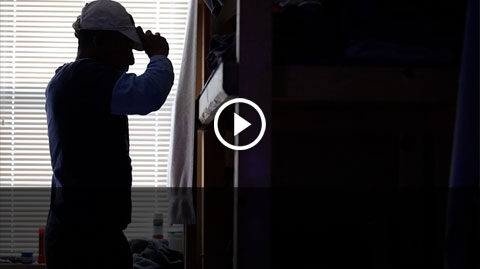
Yes, it's difficult to be away from my family. It's difficult, but oh well, you have to look for a way of life. We have to come here and suffer a little.
Our markets have never been busier. The community wants what we are trying to produce.
At the base layer are these 20 guys putting in 70 hours a week, and the fact that they are the least appreciated- it's upsetting to me and my family in general.
My name is Sergio Mesa Sanchez. I'm from Mexico; my state is Michoacán. I came here to work - to work in the fields. I'm married. I have two daughters. One that is 10 and the other is 7. There are times that I'm able to support them and sometimes no. But that's the idea, to support my family more than anything. That's the reason for being here, to support the family. Otherwise, it would be better to stay in Mexico. What would we do here?
We've been doing this all my life and it's everything I can handle to keep up. And, uh, these guys - the quality and how much they care, is off the charts. We still hire a lot of local folks, we're hiring now if anyone wants to come work. [But] if you put them in a field, with a hoe, they won't come back after lunch.
Yes, it crosses your mind, all of that, to cross [illegally]. Because over there you don't have the resources for your family. You don't have money. A lot of things... You don't have things to maintain the family.
My father-in-law was here illegally a few years ago, in 2001. He left because you have to be with your family. You can't stay here all the time. It’s really difficult, being illegal here, because you can't go [home] every year. You have to stay here longer, at least two or three years... Because you can't cross often... because of the border patrol, that doesn't let you pass.
Thanks very much to immigration for giving me the visa. And thanks to the Wittens for giving me the opportunity to work with them. And I hope I don't let them down.
If I earn $300 in a week, I might send $200. Or $150 - it depends on what I earn per week. If I don't earn much, I don't send very much. It all depends on how work is in the fields. If life turns to let me retire...maybe yes. Or maybe life won't reach that point. That's why I don't know.
Here we are in the present, and we'll see what happens in the future. The days pass, and the years... and we look at what we have, and what we will have after.
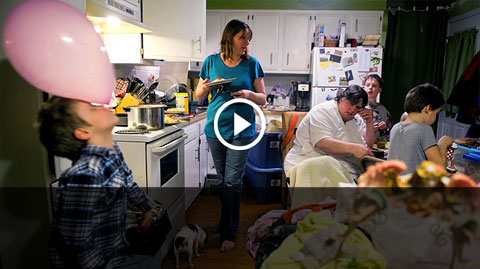
My name is Akeyna Dishong, I'm 27-years-old. I live in Coolville, Ohio.
In my household there is myself, my fiancé, Derrick, our two children, Kaleb and Jherica. I also have my mom and her two adopted children. Financially, it is better for me to be here because I do not get charged rent. Um, because I help in the house. And me not working right now, you know, I do get assistance from the state, but it's only $450 a month plus $526 in food stamps.
Mom's also said, well, "You need to go back to work." I do understand that. This is the longest I've never worked. And it is driving me crazy. You know and like I told her, "Mom if I get a job now, it's not going to last, you know, you're getting ready to have knee surgery. You can't take care of two kids yet alone four kids." It's draining to live in a household with seven people. You know my mother doesn't really realize it because she's having a hard time herself with her bi-polar and depression.
I feel like I'm holding the house together, you know if I don't do the dishes they're going to pile up, if I don't, um, do the laundry, it's going to pile up.
I've been living out on my own since I was 18-years-old. I am used to my rules, my way. Raising my children the way I know and think is the best. So just blending two families together and trying to compromise in the middle somewhere. I do feel like I'm putting my life on hold, but equally I'm not going to sit here and complain about it.
My mom has taken care of me, and you know that's what children are supposed to do. You know, I'm not going to have my mom forever, so it is important to know that I'm doing everything I can so you know, I'm talking about, you know, years down the road in the future when something happens to her, you know, I'm not going to have any guilt. I know that I've done everything I could.
As people move from middle age into retirement, the troubled economy is shifting the way the golden years are lived. These shifting standards create an opportunity to define our lives by something other than money. As the economy slowly begins to recover, Americans have a chance to discover our actual worth was always greater, deeper, and stronger. It has, and always will be defined by the pursuit of happiness, whatever that may be.
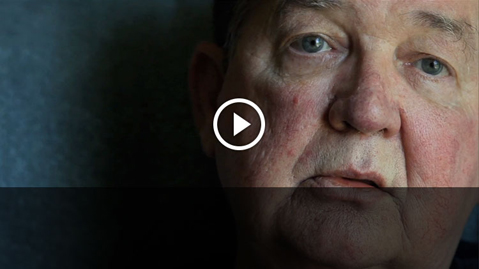
Just the satisfaction of being able to do your job, come in every day and do it and do it well, or strive to do it well, you know there's a lot of satisfaction in that. Or there was to me. So yeah, I miss work. I felt you know, we were middle class most of my working life. My wife worked full time most of her life. We didn't have a lot of luxuries but we didn't have to scrimp a lot either.
Of course, that changed dramatically after I got fired and she had to take a medical leave herself. Things got pretty tight then and it would have been a lot tighter had it not been for the fact that we live rent free or mortgage free, and my father in law helps out with the utility bills and everything. You know, there's people that's went from middle class to homeless in less than a year, and that's just really frightening.
I would look for work for two and a half years. Used up all the unemployment that I had but, you know, I couldn't get anyone to hire me because they would look at you and think to themselves, eehh, this guy's too old. It was hard to deal with that. So yeah, I was disappointed, I was upset.
When I was a senior in high school I knew I wanted to marry my wife. Through the church we had a combination wiener roast-marshmallow roast and then, of course I'd see her at school and we would talk, but our first actual date was the hay ride. She's not a big part of my day to day life. I still love her, I'd like to spend more time with her. A person with depression, they get very withdrawn and it's too bad, because I miss her. Even though she's twenty feet away, she might as well not be here. With Linda's depression, all the chores that would normally be split up between a couple, they all fell on me. The only time I had any enthusiasm for life was when the grandkids were here.
I'm really close to them and I like to think I'm a better grandfather than I was a father, simply because I can give them more time. My biggest goal was just to try to be successful at whatever I did. I've always worked a lot. Until not to many years ago, I always worked two jobs. I'm not necessarily comfortable, but I have everything I need. I just hope that there's nothing big that comes up. And we can survive, here. I don't know if you could define it as living.
I worry about both my grandkids and their future. Resources are getting tighter, people are having more problems making ends meet. They'll be okay, they probably won't have as good a lifestyle as their grandparents or great grandparents had, I just don't think they will.
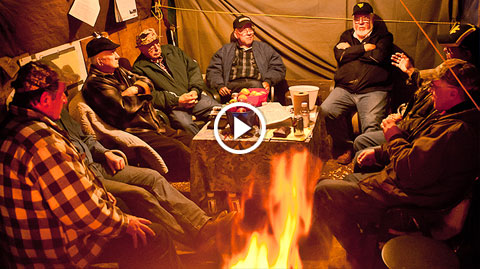
My dad used to say, 'you gotta stand for something or you'll fall for anything,' and this is just something I decided I had to stand for.
It's like going out and buying a new car, and after you paid for that car for a year, they come back and say, well, we want that car back. Well, where's my money at? If somebody would've told me 15 years ago this was gonna happen, they was gonna try to beat us out of our benefits, I would've had a hard time believing it.
Century Aluminum terminated the benefits for the post-65 retirees effective January 1st, 2010. I don't think you can put words to how terrifying it is to be our age and know that you're not gonna have any medical insurance and know that you can't possibly afford to go out and pick it up on your own.
We worked and paid for them benefits. Everyday, every man was down there.
They sacrificed for years to make sure that they have that benefit, and then when they need it the most, just, psshh, yank it right out from under them. I was actually laying right there on that couch and I was just crying my eyes out and my daughter Jody came in, and she says mom, she says, 'you've got more fire in your britches than any woman I've met in my life, you can do this, you get up off that couch and quit crying and fight back.' I was just at home one day trying to figure out what we were gonna do next and I thought, you know what we need to do, we need to go occupy Century Aluminum.
We had our retiree meeting at the union hall and I said, 'How many volunteers do I have?' And I mean it just gave me chills because the next thing you know about 15 people had their hand up. We were there for 75 days, and it's one of the Christmases, I don't know how many years I got left, but, it'll absolutely be on the top of my list as to one of the greatest Christmases I ever spent.
This country needs more of it, a lot more of it- needs people to stand up and fight for what they believe in. It's what the country was built on and as far as I'm concerned that's what the country will go down on. I have voted every election ever since I was old enough to vote. You know what, I've supported you people all of my life and now it's time you hear me. It affected people big time when this thing shut down, and now, you know, with the talks of restarting it, they're gonna need help, experienced help, to start that thing back up. I would go back and help them, but I want to see what's gonna happen here first.
I'm really anxious to watch, and see just how sincere they are about really putting a new face on Century Aluminum. We have to have industry, but if things continue in the path they're headed right now, just like what Century did, what's happening across this country the young children aren't, I mean the younger generation have nothing to look forward to. Nobody should have to work until you put your feet in the grave.
I want to know that when they wanna take that little fishing trip with their buddies, you know up in the streams up in the mountains or take a hunting trip or take that little journey down to Florida in the wintertime, that they can now use their pension for what their pension was entitled to be used for.
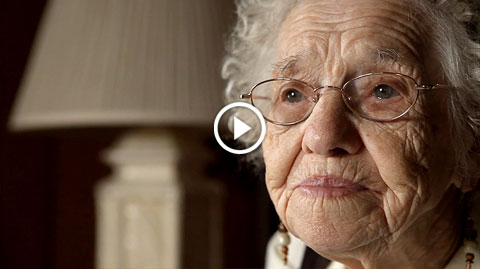
That's my mother. My dad. Every one of them's gone.
I think I'm doing pretty good to be 97 years old. I get out here and mow my own grass. I cut weeds. Plant potatoes. And I do about anything that I want to do.
To leave here and have to be moved from somewhere else to a rest home, I'd rather for the Lord to take me home.
My son, he wants me to come back to Columbus. My nephew, in West Virginia, he wants me to come, and live in there. But this place just seems like home to me. I don't want to leave. And I'm not going to leave unless I just really have to.
I've got so many friends here. And you can tell that when you go to Lottridge. Virginia's got a car. And I started running around with her. And she introduced me to her friends.
And I'm not going back to Columbus. I'm old enough that I know what I want for myself.
Thelma, there's not a judge in this country that ain't going to let you do that.
I met Thelma about five years ago when I got involved in the community center here at Lottridge. When you get to be 97 years old and you're living on your own, and you're not having problems, the quickest way to make that person go downhill would be to move them in somewhere where they didn't do anything. The neighbors here I know would see that she would get to the post office and grocery store and whatnot like that.
My caseworker, she's wanting to get me a place where HUD will pay. I pay $85 dollars a month here. But if I can't find no place around here close, I'm not going to move.
She loves when Good Works comes out because she gets to cook a big meal.
Good Works is my second family! There's cake in there. And fruit salad. Just holler. Still riding horses. Wow. So when was that taken? Uh, last year. For my birthday!
With people like Thelma, they don't consider themselves poor. Because they remember when they had nothing.
I really feel myself lucky.
Are we having a birthday soon? Can I have my hug today? Yes. Good. Yes sir!
I love ya!
And I love you too.
There's a lot of things that money can't buy.